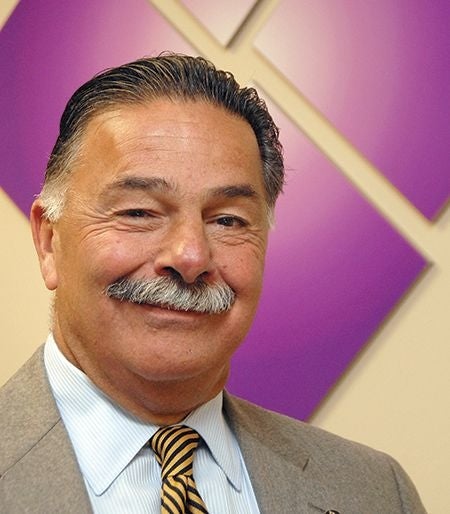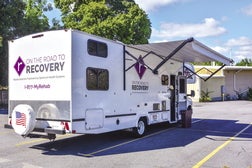Spectrum's retiring CEO Faris pioneered compassionate care for opiate addiction
 Charles J. Faris, president and CEO of Worcester-based Spectrum Health Systems, will retire in July after 45 years with the agency.
Charles J. Faris, president and CEO of Worcester-based Spectrum Health Systems, will retire in July after 45 years with the agency.
Talk about the current opioid crisis with doctors, politicians, and affected families, and you’ll hear a theme come up over and over: Instead of treating addiction to pain pills or heroin like a criminal offense, we need to find ways to help people get well and stay well. That’s something Charles J. Faris, who is retiring this summer from his position as president and CEO of Worcester-based Spectrum Health Systems Inc. after 45 years with the nonprofit, has been working on for decades.
“They’ve understood all along what addiction is and what it takes to recover,” said Janice B. Yost, president and CEO of the Health Foundation of Central Massachusetts, which has worked with Spectrum over the years. “Others are just catching up now.”
Faris—who usually goes by “Chuck”—said his start with Spectrum, as a volunteer, was something he basically stumbled into.
“I was just a kid and really didn’t have much to do,” he said. “I just kind of took an interest in it.”
From the early days in the 1970s, Faris said, Spectrum sought to help people addicted to opioids—a population that many agencies at the time preferred not to touch. It was a low-budget operation, mostly serving people who’d been convicted of crimes and had to stay at a residential treatment facility as a condition of their probation or parole. Families of people in treatment took turns preparing meals and bringing them to the facility.
“We were very poor,” Faris said. “We often didn’t know what we were going to have for dinner in the morning… The industry was really viewed as a kind of counterculture thing.”
In the years that followed, Faris and Spectrum grew together. He got a graduate degree in management, and, in 1979, became the agency’s associate executive director. He rose to vice president in 1985 and president and CEO in 2000. Meanwhile, Spectrum added outpatient counseling and methadone treatment services, expanded into other states, and began creating programs within correctional facilities to serve inmates with substance abuse problems. The agency now operates more than 140 programs in six states and treats about 80,000 people each year.
It continues to grow, with plans to open three new outpatient treatment centers this year, and the opening of two new residential facilities in Westborough last year.
An ally in philanthropy, public safety
Faris has also become a well-known figure in Central Massachusetts. Tim Garvin, president and CEO of the United Way of Central Massachusetts, said he makes a point of meeting with the Spectrum executive a couple of times a year.
“He’s available, he’s receptive, his insights are strong.”
Worcester County Sheriff Lew Evangelidis said his office has had a longstanding relationship with Faris and Spectrum. They’ve collaborated on programs, including mentoring and medication-assisted treatment, to help inmates deal with addictions and avoid relapse when they return to the community.
“Chuck has been a tremendous leader in addiction recovery in Worcester County for decades now, and he’s one of our most valued partners today as we try to solve this opioid crisis, which is affecting not only families but also the public safety of our entire community,” Evangelidis said.
Faris said Spectrum has always tried to make sure its programs were evidence-based, but in the early days that wasn’t easy. Medical researchers simply weren’t doing a lot of work on addiction.
“Back then, people would read a book and say ‘Oh, that sounds good. Let’s do something like that,’” he said.
Eventually, an influx of research funding, plus a push by public and private insurers to make sure they were only paying for proven treatment, led to more scientific treatment methods.
These days, another factor changing the face of treatment is the population dealing with opioid addiction. Over the past five to 10 years, Faris said, treatment facilities have begun seeing younger, more suburban, upper-middle-class patients.
“They come from families that are active in their communities,” he said. “They speak up when they have a problem, and they demand things from their public officials and they demand to get things from their insurance companies when they need it.”
But Faris said treatment myths still persist, like the idea that methadone therapy is “just replacing one drug with another.” In fact, he said, methadone, particularly when used in conjunction with counseling and support, is one of the most effective ways of treating addiction, and it doesn’t give users an attractive high. “Still, Faris said prejudice against this method persists.”
Recovery a lifestyle
Another dangerous myth is that addiction can be treated with one quick, intensive blow, Faris said. He said many families pay $20,000 or more to send a young person with an opioid addiction to a 14- or 28-day residential program, often out of state. Then, the patient often returns with no discharge plan and quickly falls back into drug use.
“Just because it costs lot of money doesn’t mean it works,” Faris said.
He said addiction isn’t a disorder that can be permanently cured with a single procedure. Instead, patients need to manage their disease continually, as they would if they had diabetes or heart disease. Faris said it can be hard for patients to understand the necessary lifestyle changes.
“When you’ve got someone 21, 22, 23, saying they can’t even have a drink the rest of (their) life, that’s a tough one,” he said.
Faris said that’s one reason Spectrum encourages families to visit its inpatient or outpatient programs and learn about how they can provide good support.
COO: Faris’ shoes tough to fill
Faris will officially step down as CEO on July 1, but he’ll stay with Spectrum for about a year, helping to advise his successor, Kurt Isaacson, who’s now Spectrum’s chief operating officer. Isaacson, who helped lead a different behavioral healthcare system for 16 years before joining Spectrum, said he’s pleased with the extended transition period, since Faris has “pretty big shoes that are going to be interesting to fill.”
In fact, Isaacson said, when he first joined Spectrum in 2013, he was particularly impressed with Faris’s success in ensuring that the organization had both the money to get things done and the courage to try new things.
“It’s a nonprofit, but it’s very entrepreneurial,” he said.
Read other Central Massachusetts HEALTH stories:













0 Comments